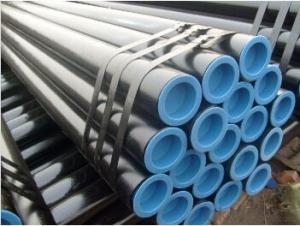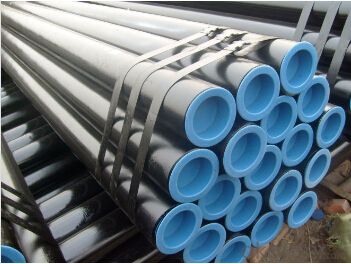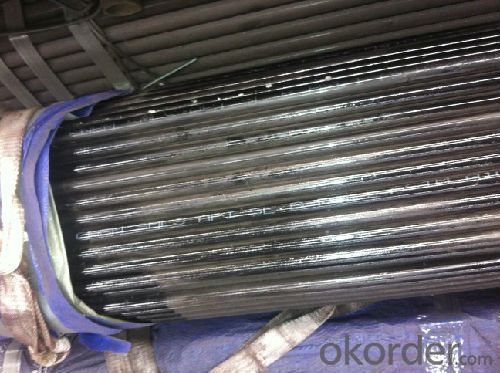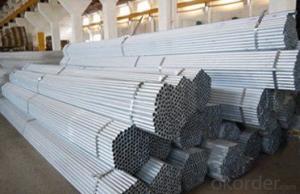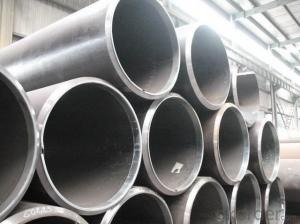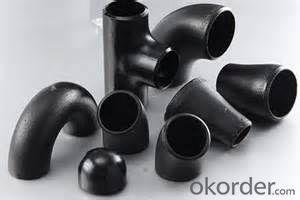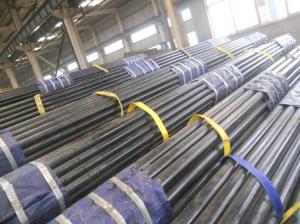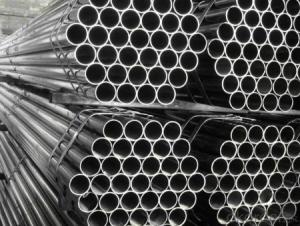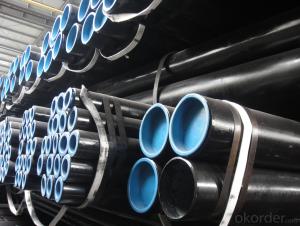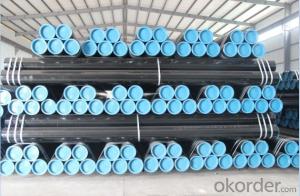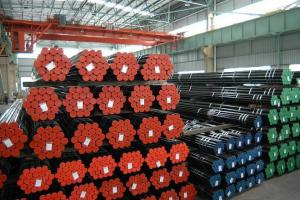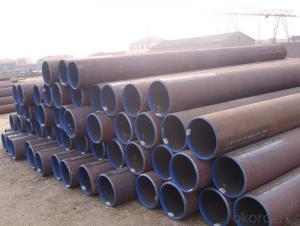Black Carbon Seamless Steel Pipe For Structure 3"
- Loading Port:
- China Main Port
- Payment Terms:
- TT or LC
- Min Order Qty:
- 25 m.t.
- Supply Capability:
- 8000 m.t./month
OKorder Service Pledge
OKorder Financial Service
You Might Also Like
1、Structure of BLACK CARBON SEAMLESS STEEL PIPE FOR STRUCTURE 3":
Seamless pipe is produced by drawing a solid billet over a piercing rod to create the hollow shell. Because the manufacturing process does not include any welding, seamless pipes are regarded as withstanding pressure better than other types, and are more easily available than welded pipe.
2、Main Features of the BLACK CARBON SEAMLESS STEEL PIPE FOR STRUCTURE 3":
• High manufacturing accuracy
• High strength
• Small inertia resistance
• Strong heat dissipation ability
• Good visual effect
• Reasonable price
3、BLACK CARBON SEAMLESS STEEL PIPE FOR STRUCTURE 3" Specification:
Standard | GB, DIN, ASTM ASTM A106-2006, ASTM A53-2007 |
Grade | 10#-45#, 16Mn 10#, 20#, 45#, 16Mn |
Thickness | 8 - 33 mm |
Section Shape | Round |
Outer Diameter | 133 - 219 mm |
Place of Origin | Shandong, China (Mainland) |
Secondary Or Not | Non-secondary |
Application | Hydraulic Pipe |
Technique | Cold Drawn |
Certification | API |
Surface Treatment | factory state or painted black |
Special Pipe | API Pipe |
Alloy Or Not | Non-alloy |
Length | 5-12M |
Outer Diameter | 21.3-610mm |
Grade | 20#, 45#, Q345, API J55, API K55, API L80, API N80, API P110, A53B |
Standard | ASME, ASTM |
1) Material:20#(ASTM A 106/A53 GRB.API5LGRB,GB),45#,16Mn,10#.
2) Specification range:OD:21.3-610mm,WT:6-70mm,length:6-12m or according to the requirement of clients.
3) Excutive standards:GB,ASME API5L.ASTM A 106/A53,Despite of the above standards,we can also supply seamless steel pipe with standard of DIN,JIS,and so on,and also develop new products according to the requirements of our clients!
4) Surface:black lacquered,varnish coating or galvanized.
5) Ends:Beveled or square cut,plastic capped,painted.
6) Packing:bundles wrapped with strong steel strip,seaworthy packing.
4、Packaging & Delivery
Packaging Details: | seaworthy package,bundles wrapped with strong steel strip |
Delivery Detail: | 15-30days after received 30%TT |
5、FAQ of BLACK CARBON SEAMLESS STEEL PIPE FOR STRUCTURE 3":
①How is the quality of your products?
Our products are manufactured strictly according to national and internaional standard, and we take a test
on every pipe before delivered out. If you want see our quality certifications and all kinds of testing report, please just ask us for it.
Guaranteed: If products’ quality don’t accord to discription as we give or the promise before you place order, we promise 100% refund.
②How about price?
Yes, we are factory and be able to give you lowest price below market one, and we have a policy that “ for saving time and absolutely honest business attitude, we quote as lowest as possible for any customer, and discount can be given according to quantity”,if you like bargain and factory price is not low enough as you think, just don’t waste your time.Please trust the quotation we would give you, it is professional one.
③Why should you chose us?
Chose happens because of quality, then price, We can give you both.Additionally, we can also offer professional products inquiry, products knowledge train(for agents), smooth goods delivery, exellent customer solution proposals.Our service formula: good quality+good price+good service=customer’s trust
SGS test is available, customer inspection before shipping is welcome, third party inspection is no problem.
6、BLACK CARBON SEAMLESS STEEL PIPE FOR STRUCTURE 3" Images:
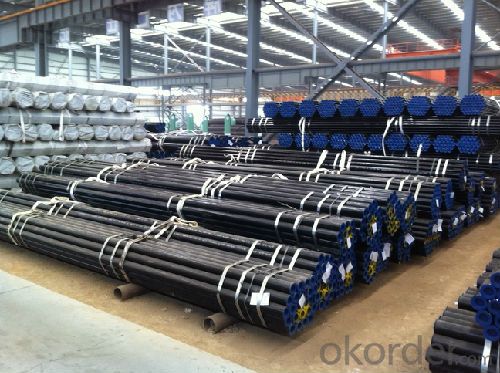
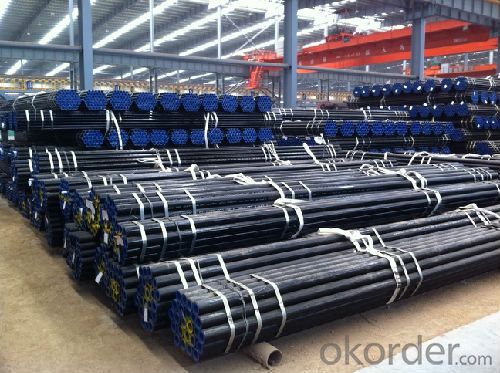
- Q: What type of steel pipe dance is used in general?
- According to international competition practice, the standard size of steel tube is 40 mm or 45 mm in diameter, and the 45mm is usually used. The height of the steel pipe is not less than 3.3 meters and not higher than 4 meters.
- Q: Can steel pipes be used in plumbing systems?
- Yes, steel pipes can be used in plumbing systems. Steel pipes have been traditionally used in plumbing systems for their durability, strength, and resistance to corrosion. However, other materials like copper and plastic pipes have become more popular in recent years due to their ease of installation, lower cost, and better resistance to certain types of corrosion.
- Q: Can steel pipes be used for oil and gas well production?
- Yes, steel pipes can be used for oil and gas well production. Steel pipes are commonly used in the oil and gas industry due to their strength, durability, and resistance to corrosion. They are able to withstand high pressure and extreme temperatures, making them suitable for transporting and extracting oil and gas from wells.
- Q: What is the difference between carbon steel and cast iron pipes?
- Various industries widely use carbon steel and cast iron pipes for different purposes. The composition and properties of these two types of pipes distinguish them from each other. 1. In terms of composition, carbon steel pipes consist mainly of iron and carbon, with trace amounts of manganese, phosphorus, sulfur, and other elements. In contrast, cast iron pipes are created by melting iron and adding a small percentage of carbon, typically ranging from 2-4%. 2. When it comes to strength and durability, carbon steel pipes generally outperform cast iron pipes. Carbon steel possesses a higher tensile strength, enabling it to handle greater pressures and reducing the likelihood of damage or deformation. On the other hand, cast iron, while strong, is more brittle and prone to cracking. 3. Carbon steel pipes necessitate additional coatings or treatments to safeguard them against corrosion. If not properly protected, these pipes can be vulnerable to rust and corrosion, particularly when exposed to moisture or corrosive substances. Conversely, cast iron pipes have inherent corrosion resistance due to the formation of a protective layer of iron oxide (rust) on their surface. 4. Cast iron pipes are typically heavier than carbon steel pipes, making them more challenging to handle and install. Comparatively, carbon steel pipes are lighter, facilitating easier transportation and installation. 5. Cast iron pipes excel in sound-dampening properties, resulting in quieter fluid flow. Conversely, carbon steel pipes tend to transmit more noise and vibrations. 6. In terms of cost, cast iron pipes generally carry a higher price tag than carbon steel pipes due to additional manufacturing processes and the increased cost of raw materials. In conclusion, the distinctions between carbon steel and cast iron pipes encompass their composition, strength, corrosion resistance, weight, noise transmission, and cost. The choice between the two relies on the specific application, budgetary considerations, and environmental factors.
- Q: How do you determine the pipe schedule for steel pipes?
- The pipe schedule for steel pipes is determined based on several factors including the pressure rating, wall thickness, and outer diameter of the pipe. The pipe schedule is a standardized system used to classify the thickness of pipe walls, and it helps ensure compatibility and safety in various applications. To determine the pipe schedule for steel pipes, you need to consider the maximum pressure the pipe will be subjected to. This is usually expressed in pounds per square inch (psi) or bars. The pressure rating of a pipe indicates the maximum pressure it can withstand without failure or leakage. The higher the pressure rating, the thicker the pipe walls need to be. The wall thickness of the pipe is another important factor in determining the pipe schedule. It is typically expressed in inches or millimeters. The wall thickness is directly related to the pressure rating, as thicker walls can handle higher pressures. The American National Standards Institute (ANSI) provides a set of standard wall thicknesses for steel pipes known as the "pipe schedule." The outer diameter of the pipe is also considered when determining the pipe schedule. The outer diameter can vary depending on the specific application and requirements. It is important to choose a pipe with the appropriate outer diameter to ensure proper fit and compatibility with fittings, valves, and other components. In summary, the pipe schedule for steel pipes is determined by considering the maximum pressure, wall thickness, and outer diameter. By matching these factors with the appropriate pipe schedule, you can ensure that the steel pipe will be suitable for its intended use and capable of withstanding the required pressure.
- Q: What is the minimum wall thickness for steel pipes?
- The minimum wall thickness of steel pipes varies depending on different factors, including the pipe's intended use and the specific industry standards and regulations. Determining the minimum wall thickness generally involves considering factors like the pipe's diameter, material strength, and the pressure or load it will experience during operation. In the oil and gas industry, for instance, the minimum wall thickness for steel pipes is typically specified by industry standards such as API 5L or ASME B31.3. These standards take into account elements such as the pipe's diameter, the material's yield strength, and the maximum pressure it will encounter. In other applications, such as structural or mechanical engineering, the minimum wall thickness for steel pipes is determined by factors like the pipe's intended load-bearing capacity, the desired safety factor, and any relevant building codes or regulations. To establish the specific minimum wall thickness requirements for steel pipes in a particular application, it is essential to consult the appropriate industry standards, codes, or regulations.
- Q: What are the different threading options for steel pipes?
- The different threading options for steel pipes include tapered threads (NPT/NPTF), straight threads (UN/UNF), and buttress threads.
- Q: How are steel pipes insulated for thermal efficiency?
- Steel pipes are insulated for thermal efficiency using various methods such as applying insulation materials like fiberglass, mineral wool, or foam to the surface of the pipes. This insulation helps to prevent heat loss or gain, thereby improving the energy efficiency of the pipes. Additionally, protective outer layers such as aluminum or PVC jackets are often added for extra insulation and to provide resistance against moisture and external elements.
- Q: What are the different types of steel pipe unions?
- Various industries and applications commonly utilize several types of steel pipe unions. Some of the most frequently used types are as follows: 1. Threaded Union: This union features female threads on both ends, facilitating easy attachment to two male threaded pipes. It ensures a reliable connection that is resistant to leaks. 2. Socket Weld Union: On one end, this union has a socket, while the other end is equipped with a female threaded connection. It is specifically designed for socket welding, where the pipe is inserted into the socket and then welded around the joint, resulting in a robust and long-lasting connection. 3. Butt Weld Union: This specific union is employed for joining two pipes with butt weld ends. It necessitates beveling the pipes and subsequently welding them together, creating a sturdy and permanent connection. 4. Compression Union: Typically used for connecting pipes made of softer materials like copper or plastic, compression unions consist of a compression nut and a compression ring. These components are tightened onto the pipe, ensuring a tight and secure seal. 5. Flanged Union: This union is equipped with flanges on both ends, allowing it to be bolted onto two flanged pipes. Flanged unions are commonly utilized in applications where easy disassembly and reassembly are necessary. 6. Grooved Union: Grooved unions possess grooves on their ends, which are utilized for connecting pipes by inserting them into the grooves and securing them with a coupling. They are often utilized in fire protection systems and other applications where quick installation and easy maintenance are of utmost importance. These examples represent only a fraction of the numerous types of steel pipe unions available. The selection of a union depends on the specific requirements of the application, such as the pipe material, size, and operating conditions. Seeking advice from a professional or consulting industry standards can aid in determining the most suitable union for a particular project.
- Q: What are the different types of steel pipe coatings for corrosion protection?
- Some of the different types of steel pipe coatings for corrosion protection include epoxy coatings, polyethylene coatings, zinc coatings, and coal tar enamel coatings.
Send your message to us
Black Carbon Seamless Steel Pipe For Structure 3"
- Loading Port:
- China Main Port
- Payment Terms:
- TT or LC
- Min Order Qty:
- 25 m.t.
- Supply Capability:
- 8000 m.t./month
OKorder Service Pledge
OKorder Financial Service
Similar products
Hot products
Hot Searches
Related keywords
